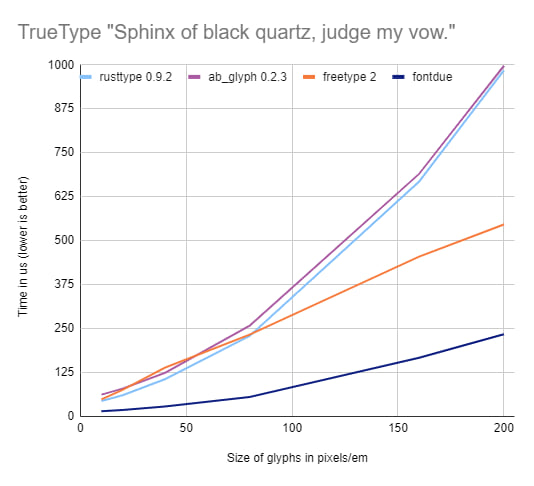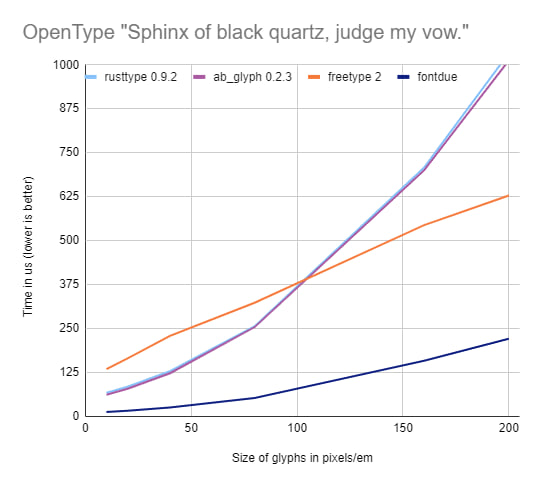29 releases
| 0.9.3 | Feb 12, 2025 |
|---|---|
| 0.9.2 | Jun 10, 2024 |
| 0.9.0 | May 13, 2024 |
| 0.8.0 | Nov 26, 2023 |
| 0.0.1 | Sep 13, 2019 |
#2 in Data formats
74,902 downloads per month
Used in 261 crates
(77 directly)
255KB
4K
SLoC
Fontdue
Fontdue is a simple, no_std (does not use the standard library for portability), pure Rust, TrueType (.ttf/.ttc) & OpenType (.otf) font rasterizer and layout tool. It strives to make interacting with fonts as fast as possible, and currently has the lowest end to end latency for a font rasterizer.
Roadmap
fontdue is designed to be a replacement for rusttype (link), ab_glyph (link), parts of glyph_brush (link), and glyph_brush_layout (link). This is a class of font libraries that don't tackle shaping.
It's unlikely I'll have time to integrate with a shaping library. If you need a more complete font engine you should check out the wonderful Cosmic Text project, which is a very complete pure rust text library.
A non-goal of this library is to be allocation free and have a fast, "zero cost" initial load. This library does make allocations and depends on the alloc crate. Fonts are fully parsed on creation and relevant information is stored in a more convenient to access format. Unlike other font libraries, the font structures have no lifetime dependencies since it allocates its own space.
Example
Live demo. This demo is a web-assembly build of fontdue rasterizing to a browser canvas. It provides a side by side of characters being rasterized between fontdue and the browser's canvas text api provided with the same parameters.
Some other examples can be found under ./dev/examples.
Rasterization
The rasterization API should not see major changes in the near future.
// Read the font data.
let font = include_bytes!("../resources/Roboto-Regular.ttf") as &[u8];
// Parse it into the font type.
let font = fontdue::Font::from_bytes(font, fontdue::FontSettings::default()).unwrap();
// Rasterize and get the layout metrics for the letter 'g' at 17px.
let (metrics, bitmap) = font.rasterize('g', 17.0);
Layout
The layout API is immature and may see breaking changes. The layout fontdue provides is naïve and is only designed to be on par with existing libraries like glyph_brush.
// Read the font data.
let font = include_bytes!("../resources/fonts/Roboto-Regular.ttf") as &[u8];
// Parse it into the font type.
let roboto_regular = Font::from_bytes(font, fontdue::FontSettings::default()).unwrap();
// The list of fonts that will be used during layout.
let fonts = &[roboto_regular];
// Create a layout context. Laying out text needs some heap allocations; reusing this context
// reduces the need to reallocate space. We inform layout of which way the Y axis points here.
let mut layout = Layout::new(CoordinateSystem::PositiveYUp);
// By default, layout is initialized with the default layout settings. This call is redundant, but
// demonstrates setting the value with your custom settings.
layout.reset(&LayoutSettings {
..LayoutSettings::default()
});
// The text that will be laid out, its size, and the index of the font in the font list to use for
// that section of text.
layout.append(fonts, &TextStyle::new("Hello ", 35.0, 0));
layout.append(fonts, &TextStyle::new("world!", 40.0, 0));
// Prints the layout for "Hello world!"
println!("{:?}", layout.glyphs());
// If you wanted to attached metadata based on the TextStyle to the glyphs returned in the
// glyphs() function, you can use the TextStyle::with_metadata function. In this example, the
// Layout type is now parameterized with u8 (Layout<u8>). All styles need to share the same
// metadata type.
let mut layout = Layout::new(CoordinateSystem::PositiveYUp);
layout.append(fonts, &TextStyle::with_user_data("Hello ", 35.0, 0, 10u8));
layout.append(fonts, &TextStyle::with_user_data("world!", 40.0, 0, 20u8));
println!("{:?}", layout.glyphs());
Performance
Rasterization
These benchmarks measure the time it takes to generate the glyph metrics and bitmap for the text "Sphinx of black quartz, judge my vow." over a range of sizes. The lower the line in the graph the better.


Layout
This benchmark measures the time it takes to layout latin characters of sample text with wrapping on word boundaries.

License
Licensed under any one of
- Apache License, Version 2.0, (LICENSE-APACHE or http://www.apache.org/licenses/LICENSE-2.0)
- MIT license (LICENSE-MIT or http://opensource.org/licenses/MIT)
- Zlib license (LICENSE-ZLIB or http://opensource.org/licenses/Zlib)
at your option.
Contribution
Unless you explicitly state otherwise, any contribution intentionally submitted for inclusion in the work by you, as defined in the Apache-2.0 license, shall be multi-licensed as above, without any additional terms or conditions.
Notices
Maintenance
Please bear with me on new features or quirks that you find. Bugs will take priority, but I don't have as much time as I would like to work on fontdue so please be patient, this is a solo project.
TrueType & OpenType Table Support
Fontdue depends on ttf-parser (link) for parsing fonts, which supports a wide range of TrueType and OpenType features.
Attribution
Fontdue started as a vaguely more production ready fork of font-rs (link) because of how fast it made rasterization look, and how simple the rusttype (link) crate made font parsing look. Since then, I've read a lot of font specification and modern rasterization techniques, rewriting fontdue from the ground up in the process into its own unique beast.
Dependencies
~2MB
~35K SLoC